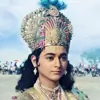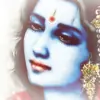Having Kuru blood was never required to become a King in that dynasty. It was always based on merit first, and in the case of sons, the elder son must have merit and be eligible to be King, only then was he made King.
King Bharata, an ancestor of the Pandavas and Kauravas, had 7 sons but all seven lacked merit, so he chose a commoner to become his heir. This proves that the Kurus always chose a merit based King over one who lacked it.
King Dhritarashtra was never entitled to be King just because he was elder. As he was blind, Pandu became next in line and thus his sons (as long as they held merit) would be King after him. When Pandu went on exile, Dhritarashtra was only the regent. He was never actually crowned the King. He was only officially crowned when the Pandavas received Khandavaprastha and denied any claim to Hastinapura.
Duryodhana had no claim simply because he was "blood" related. Neither Dhrit nor Pandu shared blood with Vichitraveerya and yet they were heirs, so blood never mattered.
Also, Duryodhana was never King even when the Pandavas were on exile. Dhrit was still King then, and Duryodhana may have made some decisions, but Dhrit was still the King and had ultimate decision making power, and his advisers were always Bhishma and Vidura before Duryodhana. People greatly overstate Duryodhana's "ruling capabilities" during exile, but the fact is, he never ruled, and in fact he was obsessed with spying on the Pandavas and figuring out what they were up to. Twice he attacked them and lost, and during the 13th year he spent all his time trying to track them down. So I doubt he ever did much ruling. It was Dhrit, advised by Vidura and Bhishma as always.
































